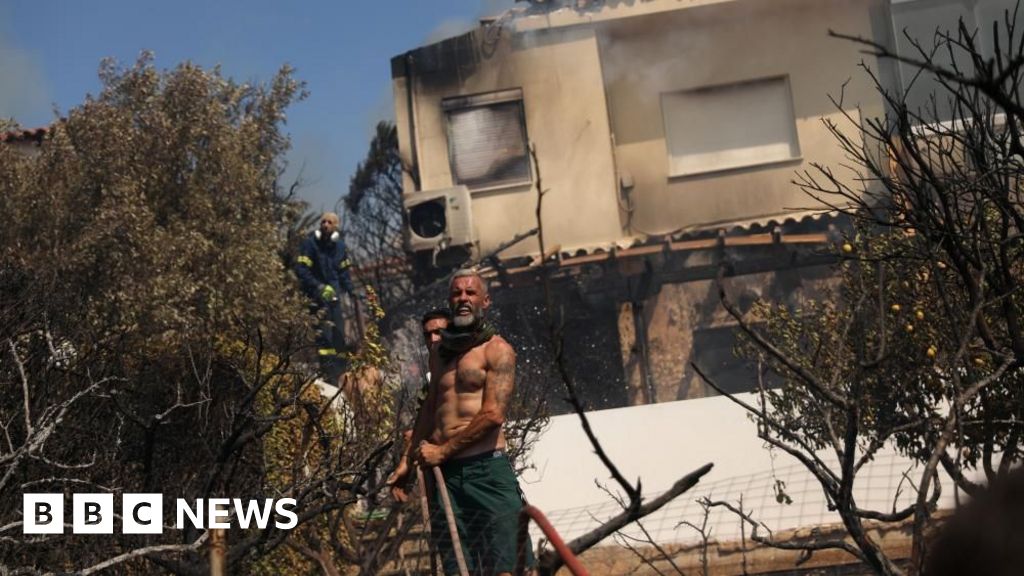A large wildfire swept through the coastal towns of Palaia Fokaia and Thymari 40 km (25 miles) southeast of Athens, destroying homes and forcing evacuations as it neared the beach. The flames erupted in low vegetation but quickly spread into residential areas, as Greece experienced its first heatwave of the summer. At least 20 homes were destroyed and many others suffered structural damage, according to local officials. Strong winds and soaring temperatures of up to 40°C made the fire extremely difficult to control. Local residents joined firefighters, forest rangers and aircraft in trying to contain the fire and protect their homes. The coast guard was also deployed along the coastline. Emergency alerts were issued via the 112 system, urging residents to evacuate the a series of towns and villages. Greece has sought to beef up its response to wildfires, which have become increasingly common because of its long, hot summers and warming climate. An extra 18,000 firefighters backed up by volunteers have been deployed this year, officials say, for the rest of the fire season which ends in October. Earlier this week thousands of hectares were torched on Chios, Greece's fifth-largest island. A Georgian woman was arrested on Wednesday on suspicion of unintentionally starting a fire by dropping a cigarette. One resident in Thymari told Greek website Kathimerini on Thursday that by the time she had reached her home it had burned down because of the strong winds. Another said his neighbours' homes had been destroyed but he had been more fortunate. Further east along the coast towards Cape Sounion, on the tip of the Attica peninsula, the fire crossed the coastal road and moved toward the ridge of a nearby hill. Authorities said more than 1,000 people were evacuated from affected areas. Eleven tourists were rescued from a beach after becoming trapped by the advancing flames, according to local authorities. Despite evacuation orders, some residents refused to leave and attempted to defend their homes using garden hoses and other improvised means. Authorities warned that such actions endangered lives and obstructed emergency services. According to Greek state broadcaster ERT, at least 40 people, including children and elderly residents, were rescued by police after becoming trapped. Fire Service spokesperson Vasileios Vathrakogiannis said firefighters were engaged in an intense battle on the ground and by air, particularly in areas where the fire was burning close to houses. Local officials in villages inland from Thymari described the situation as extremely difficult. "All of the municipality's facilities were open to anyone who needed shelter or medical help," Babis Galanis, a local deputy mayor told ERT. The head of Greece's fire service has ordered a special arson investigation unit to the scene to examine whether the fire had been deliberately set. According to a report by Greece's Risk Assessment Committee, extremely high temperatures are expected on Friday, with a very high risk of wildfires in Attica, Evia, the Peloponnese, and the northern Aegean.
Homes burn in Greece as wildfire sweeps through coastal towns
TruthLens AI Suggested Headline:
"Wildfire Devastates Coastal Towns in Greece, Prompting Evacuations"
TruthLens AI Summary
A significant wildfire has ravaged the coastal towns of Palaia Fokaia and Thymari, located approximately 40 kilometers southeast of Athens, leading to the destruction of homes and prompting mass evacuations. The fire, which began in low vegetation, rapidly spread into residential areas, exacerbated by Greece's first heatwave of the summer, with temperatures soaring up to 40°C. Local officials reported that at least 20 homes were completely destroyed, with many others suffering structural damage. The combination of strong winds and extreme heat made firefighting efforts particularly challenging. Residents joined forces with firefighters, forest rangers, and aerial support to combat the flames, while the coast guard was deployed to assist along the coastline. Emergency alerts were issued via the national alert system, urging residents to evacuate from several towns and villages that were in the fire's path.
In a broader context, Greece has been proactive in enhancing its wildfire response capabilities due to the increasing frequency of such incidents attributed to prolonged hot summers and climate change. This year, authorities have mobilized an additional 18,000 firefighters supplemented by volunteers to tackle wildfires throughout the fire season, which lasts until October. Earlier in the week, significant areas were burned on Chios, Greece's fifth-largest island. A Georgian woman was arrested for allegedly starting a fire by carelessly discarding a cigarette. Eyewitness accounts reveal that some residents were unable to save their homes despite efforts to defend them with makeshift tools. Local authorities reported that over 1,000 individuals were evacuated from affected regions, and at least 40 people, including vulnerable groups, were rescued after being trapped. Fire Service spokesperson Vasileios Vathrakogiannis highlighted the intense firefighting efforts on the ground and from the air, particularly in regions close to residential structures. The head of Greece's fire service has initiated a specialized investigation unit to determine whether the fire was set intentionally, as forecasts predict continued extreme temperatures and a high risk of wildfires across various regions in Greece.
TruthLens AI Analysis
You need to be a member to generate the AI analysis for this article.
Log In to Generate AnalysisNot a member yet? Register for free.
